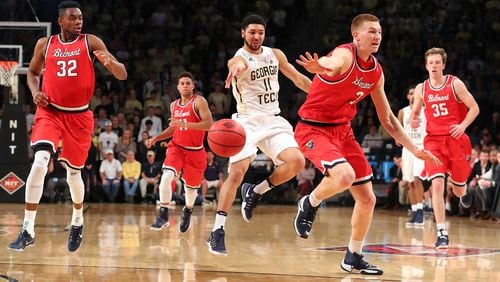Perhaps the most convincing evidence of the impact that Georgia Tech fans had on their team is this: The Yellow Jackets finished their home schedule at 17-4, setting a school record for home wins, and go into their NIT quarterfinal matchup at Mississippi at 2-10 on the road.
In the nine ACC home games and the two NIT conquests at McCamish, opponents shot 35.8 percent, which helped generate a 9-2 record. In Tech’s nine road ACC games (all but one of which they lost), opponents shot 46.2 percent.
“It’s a credit to our home court advantage that we got here, the crowd willing us to victory,” coach Josh Pastner said Monday. “It’s a straight, direct reflection on our home crowd, on our student section.”
Tech wasn’t the only ACC team to struggle away from home. ACC teams won 68.9 percent of their league games in their own arenas, which was the highest rate of any Division I conference. Regardless, the Jackets have an opportunity to address a weakness Tuesday night in Oxford, Miss. Pastner called it the next step toward becoming an NCAA Tournament team. One criterion that the NCAA selection committee often relies on is a team’s record away from home.
“We’ve won two hard-fought road games, but we’ve got to be able to win more than that,” Pastner said. “Protect home court but win our share of road games as a program if we want to, even as we move forward in the future, if we want to get into the NCAA Tournament.”
Of their eight road losses in ACC play, the Jackets were eviscerated by Duke (110-57) and Syracuse (90-61) in two. The Blue Devils and Orange made a combined 31 of 55 3-point tries in games played under atypical circumstances. The Orange celebrated senior day against Tech and, in the Duke game, Blue Devils guard Grayson Allen returned from his one-game suspension and coach Mike Krzyzewski was on the bench for his final game before taking a temporary leave for back surgery.
Of the other six, the Jackets went into the final minute with a chance to win two, against Virginia Tech and Notre Dame. Tech was beaten decisively in the remaining four, by Virginia, Clemson, Wake Forest and Miami. The Jackets were waylaid by illness, sickness or both in three of the four, Virginia being the exception.
Offensively, Tech hasn’t experienced significant difference. The Jackets shot 44.2 percent in the nine ACC games and two NIT games at home, and 43.2 percent on the road. Again, defensive play was better at McCamish. ACC and NIT opponents had a .98 assist/turnover ratio at McCamish. The ratio was 1.18 in opposing ACC arenas.
Perhaps not surprisingly, a significant discrepancy rests in fouls and free throws. At McCamish, Tech averaged 13.5 fouls and opponents averaged 18.3 in the 11-game ACC/NIT set. In ACC road games, the Jackets were called for 18.7 fouls per game and the home teams were called for 14.4.
At McCamish, the Jackets shot about eight more free throws than their opponents. On the road, Tech was outshot by 6.3 free throws per game.
This is of particular concern against the Rebels, who get rich at the free-throw line. Mississippi leads Division I in free throws per game (26.2) and generates 25.2 percent of its points from the free-throw line, the fourth-highest rate in the country, according to KenPom. Statistically speaking, the Rebels get to the free-throw line better than just about anything else they do.
The interior matchup of Tech center and ACC defensive player of the year Ben Lammers and Mississippi forward Sebastian Saiz figures to be critical. Saiz, a 6-foot-9, 240-pound forward from Madrid, averages 15 points and six free throws per game. One Lammers strength has been his ability to defend and block shots without fouling. It will be particularly necessary Tuesday.
“They get fouled on a lot of second chances,” Pastner said. “So they rebound and get fouled.”
If they can emerge victorious from the year-old Pavilion at Ole Miss (the Rebels are 13-5 at home this season), they will advance to the NIT semifinals next Tuesday in New York, continuing a most unexpected season by overcomng a season-long challenge. It would be Tech’s second trip semifinals in school history. If not, spring break begins immediately, and the puzzle of winning on the road will go unsolved into the offseason.
“I think things are lining up,” forward Quinton Stephens said. “We’ve got to go get an away (win).”







